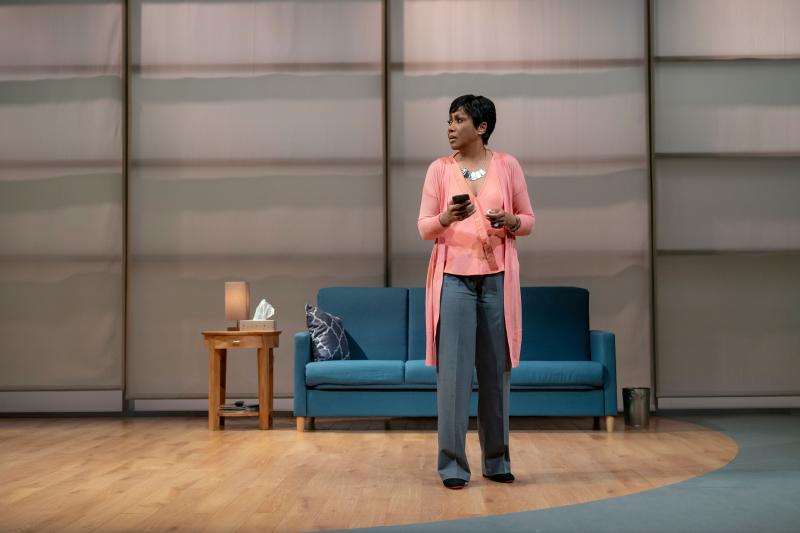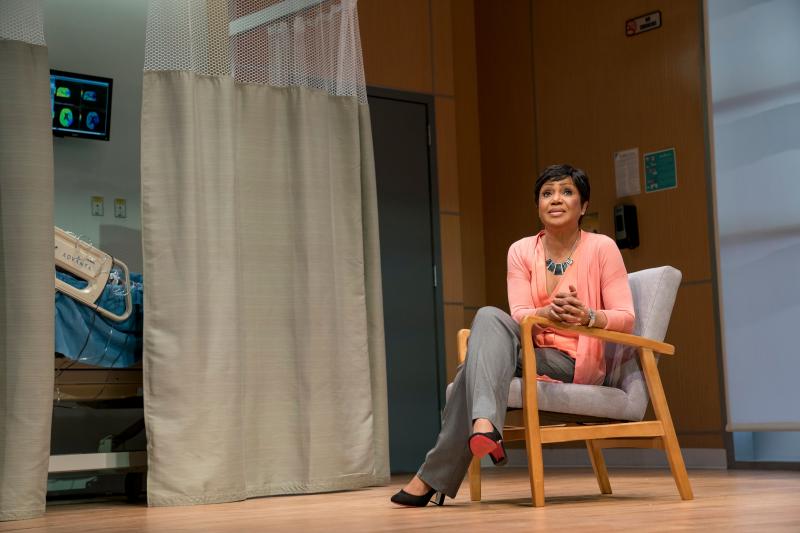Review: Brenda Pressley Ponders Infidelity and Classism in Chisa Hutchinson's PROOF OF LOVE
Playwright Chisa Hutchinson describes Constance Daley, the character who voices her solo play, Proof of Love, as "close as you can get to a WASP while being black."

"I am who I am," is the way the character puts it to her husband Maurice. "I was born into what I was born into: a family-hell, a society-that values money and etiquette and good grammar, dammit."
Maurice doesn't answer. He's been comatose for days after surviving a car crash. And Constance, after figuring out how to unlock his cell phone, has discovered through texts and voicemail messages that Maurice has not only been having an eight-year affair with a woman named Lashonda, but that the accident occurred when he was apparently driving to her home to respond to her message demanding a full-time commitment or nothing at all.
PROOF OF LOVE is the latest solo theatre venture produced at the Minetta Lane Theatre by Audible, Inc., which records its word-focused productions for audio release. Produced in association with New York Theatre Workshop, it is the first play commissioned by Audible's Emerging Playwright program.
Most likely, listeners will envision the private hospital room where Maurice lies as much smaller than the lounge-sized space provided by set designer Alexis Distler. Having the patient's curtained-off bed pushed to an extreme side gives director Jade King Carroll little choice but to have Constance (excellent Brenda Pressley -- cool, deliberate and emotionally focused) rarely direct her words at him.
What we do hear from Maurice are the varied sounds of inhales and exhales from his ventilator and the soft beeps of monitoring equipment, provided by sound designer Justin Ellington.

"I don't know what it is with hood black folks and names that begin with 'la'", Constance ponders after learning the name of her rival. "Do they think that it will make their daughters sound exotic?"
While Constance is accustomed to wealth, Maurice grew up in the projects and worked his way up to his "new money" status. The cultural gap between them has created issues all throughout their marriage.
She describes how she took his habit of leaving just a little bit of juice or milk in containers as being inconsiderate, unaware that, being raised in a poor household, he was taught to always leave a little for the next person.
There are cultural clashes between Constance and their daughter, as well. For one thing, she resents being "whitewashed her at baptism" by being named Madison.
"I bet she'd wish Lashonda were her mother. She's always wanted an authentically black mother," Constance musses. "She'd probably throw a fish-fry or a cook-out, some distinctly black celebration replete with line-dances and purple drank."
As specified in the script, Constance is "not a sentimental person, and is soooo not practiced in emoting," so Pressley rarely varies from a rather clinical, conversational tone. We can certainly sympathize with Constance for being the victim of infidelity but this white reviewer will leave it to others to consider if her attitude is unsympathetically elitist or a defensive armor against those who would call her "a sell-out who's ashamed to be black."
Reader Reviews


